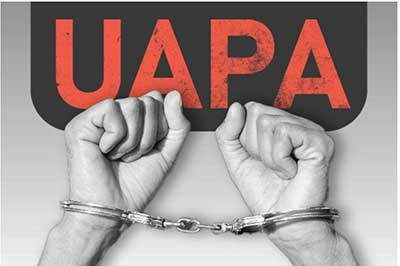Date: 20/02/2023
Relevance: GS-2: Indian Constitution - historical underpinnings, evolution, features, amendments, significant provisions and basic structure.
Key Phrases: Supreme Court, Constitution, Anti-Terror Law, Prosecutions, TADA, POTA, Unlawful Activity.
Context:
- Recently two cases have drawn attention to India's comprehensive anti-terror law, the Unlawful Activities (Prevention) Act (UAPA), 1967.UAPA has never been subject to a constitutional review. Its repeated violations undermine our constitutional principles.
Key Highlights:
- Since the passage of the Terrorist and Disruptive Activities (Prevention) Act (TADA) in 1985, and the Prevention of Terrorism Act (POTA) in 2002, the extraordinary nature of anti-terror laws has remained a matter of intense political debate.
- TADA and POTA were known for their lengthy pretrial detention, in-custody torture, false prosecutions, and forced confessions.
- The 2004 version of UAPA was supposed to be a more humane variant of its predecessors.
Unlawful Activities (Prevention) Act, 1967 UAPA Provisions:
- Unlawful Activities (Prevention) Act, 1967 is primarily an anti-terror law – aimed at more effective prevention of certain unlawful activities of individuals and associations and for dealing with terrorist activities.
- Key Provisions of the Act:
- The Act assigns absolute power to the central government. It can declare an activity as unlawful, by way of an Official Gazette.
- The act has the death penalty and life imprisonment as the highest punishments.
- Under the act, both Indian and foreign nationals can be charged. It will be applicable to the offenders in the same manner, even if the crime is committed on foreign land, outside India.
- The investigating agency can file a charge sheet in a maximum of 180 days after the arrests. This duration can be extended further after information to the court.
- 2019 Amendment:
- The amendment empowers the Central Government to designate individuals as terrorists on certain grounds.
- It empowers the Director-General, National Investigation Agency (NIA) to grant approval for seizure or attachment of property when the case is under investigation by the agency.
- It also empowers the officers of the NIA, of the rank of Inspector or above to investigate cases of terrorism in addition to those conducted by the DSP or ACP or above rank officer in the state.
Role of Courts:
- The Supreme Court, through judicial interventions, had evolved
many safeguards in how TADA and POTA were applied.
- Categorizing TADA detainees into four different brackets to grant bail (Shaheen Welfare Association v Union of India, 1996) and setting up state and central review committees to prevent the misuse of TADA were two such major judicial innovations (Kartar Singh v State of Punjab, 1994).
- However in the era of the UAPA, the court has been unable to provide adequate protections against arbitrary arrests, malicious prosecutions, and lengthy detentions prior to trial. The decision in NIA v. Zahoor Ahmad Shah Watali (2020) has made it nearly impossible to grant bail.
Examining UAPA's Scope:
- The debate on the UAPA must go beyond the validity of a few particular provisions. The law's purpose and scope must be thoroughly examined. The central issue is proportionality, a foundational principle of our Constitution.
- The Court must determine whether the breadth and consequences of UAPA are substantially out of proportion to its declared goals. Terms like “terrorist act”, “unlawful activity”, “advocacy”, “conspiracy”, “likely to threaten”, and “likely to strike terror” are ambiguous and appear to grant agencies arbitrary authority.
- Even though terms like "terrorist act" are subjective and
difficult to define, the appropriate boundaries for judicial judgement can
be established.
- The key is to have a law that effectively combats terrorism while adhering to the Constitution's requirements. Priority should be placed on the ability to identify, neutralize, and bring terrorists to justice.
Conclusion:
- UAPA has one of the worst prosecution success rates. According to
a 2022 report by the PUCL, less than 3% of UAPA-related arrests resulted in
convictions between 2015 and 2020.
- According to the report, only 1,080 of the 4,690 people detained under the UAPA between 2018 and 2020 were granted bail.
- A few petitions are pending before the SC, challenging the validity of the 2019 amendment by which the government can now designate individuals as terrorists.
- The Court must seize the opportunities presented by these challenges to spell out precisely the objectives of the law.
Source: The Indian Express
Mains Question:
Q. UAPA has never been subject to a constitutional review. Its repeated violations undermine constitutional principles. Critically evaluate (250 words).







